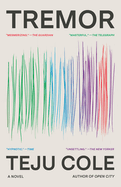
Tremor, Teju Cole's third novel, is an impressively kaleidoscopic work of autofiction that journeys between the U.S. and Nigeria as it questions the ownership and meaning of Black art. Tunde, a Nigerian photographer and Harvard academic, appears to be an autobiographical stand-in for the author. Tunde's antiquing trip to Maine with his Japanese American partner, Sadako, sparks ethical ruminations. Surprised to find an authentic African headdress on sale, Tunde decides "he ought to rescue it" by purchasing it. Cultural appropriation ("vampirism"), microaggressions, Harvard's history of slavery, and the literal theft of African artifacts are the stuff of his interior musings as well as of his recorded lecture describing museums as "a zone of sustained shocks." Tunde decries the "persistent history of white people thinking they know better than the rest of us."
The time devoted to Tunde's niche obsessions--Black serial killer Samuel Little; jazz and world music; the legend of Sundiata Keita, founder of Mali--edges toward self-indulgent, but Cole (Every Day Is for the Thief) widens the frame with an ever-shifting point of view. The first half sticks close to Tunde via third person, but later his travels occasion a series of first-person testimonials--from a chauffeur, a mural artist, a church musician, and so on--that coalesce into a glistening portrait of contemporary Lagos. Closing sections alternating between Tunde's and Sadako's first-person narration make clear Cole's debt to Virginia Woolf. The sophisticated structure is just one of the highlights of this elegant study of art criticism, suffering, and subjectivity. --Rebecca Foster, freelance reviewer, proofreader, and blogger at Bookish Beck

